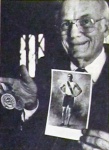SABR Salute: Ellery Clark
Editor’s note: The SABR Salute, first bestowed upon writer Fred Lieb in 1976, was designed as a manner of recognizing the contributions of some of the older members of the Society. Subsequent SABR Salutes appeared in the SABR Membership Directory and honored members who had made great contributions to baseball historical research. Ellery H. Clark Jr. received the SABR Salute in 1984; the following biographical sketch appeared in that year’s membership directory.
 Although Ellery Clark Jr., is receiving considerable publicity this year in connection with his long association with and interest in the U.S. Olympics, we should not forget his long-time interest and research into the National Game. It was after-the-fact research, for example, that made him aware that the Boston Red Sox defeated the Chicago White Sox on August 6, 1909, the day he was born in Cohasset, Mass. Cohasset continues to be his summer home these 75 years later.
Although Ellery Clark Jr., is receiving considerable publicity this year in connection with his long association with and interest in the U.S. Olympics, we should not forget his long-time interest and research into the National Game. It was after-the-fact research, for example, that made him aware that the Boston Red Sox defeated the Chicago White Sox on August 6, 1909, the day he was born in Cohasset, Mass. Cohasset continues to be his summer home these 75 years later.
Son of Olympic champion Ellery H. Clark, he graduated from Roxbury Latin School in 1929 and Harvard with a BA cum laude in 1933. He was prominent in school-boy track in Massachusetts, but was offered a baseball scholarship to Dartmouth. He turned it down in favor of Harvard because Dartmouth did not have a Naval ROTC unit. He received his first Naval commission in 1933 and spent a total of 35 years in the Navy, including service on the attack carrier Randolph in World War II. He also was a member of Secretary Forrestal’s Special Committee on Reorganization of the Navy after the war.
Armed with an MA from Boston University, Ellery served as a professor of English and History for many years at the U.S. Naval Academy, Annapolis, Md. Captain Clark also was the Academy’s assistant cross country and track coach prior to ending his long service there in 1978. He continues to live in Annapolis.
Ellery became interested in baseball at an early age, thanks to the inspiration of his father and old-time player George Wright, whose career went back even further than the 1871 NA Boston champions. Unlike most baseball fans, the enthusiastic Ellery mixed with the players and developed lasting friendships. His personal contacts and/or correspondence embraced such players as Jimmy Collins, Fred Parent, Cy Young, Harry Hooper, Duffy Lewis, Joe Wood, Howard Ehmke and Ted Williams. The energetic young researcher even hit it off well with Ty Cobb and Carl Mays, two controversial stars of 1920s.
His personal contacts, his voluminous correspondence and photo collection, and his statistical analysis provided the primary bases for three books about the Red Sox which he authored in 1975 (Red Sox 75th Anniversary History), 1977 (Red Sox Forever) and 1979 (Red Sox Fever). Ellery not only called on this rich experience for books but to prepare baseball biographies on several players for the Encyclopedia of Sports and to expand his study of main causes of longevity of former players. In 1976, he had a 30-day exhibit of early American League baseball photos and personal letters in Boston. Harry Hooper dubbed him “Bulldog” Clark for his persistent but unsuccessful efforts to get various baseball commissioners to issue retroactively World Series emblems to the 1918 champions, who did not receive them in that war year.
Captain Clark’s baseball activities are not necessarily diffused in 1984 because of the Olympics. Ellery’s father, a Harvard track star and later a national AAU champion, won two first-place medals at the 1896 Olympics in Athens. Because of the considerable publicity given this year to U.S. (and Harvard athlete) participation in the first modem Olympics, Ellery has been in Athens to film a CBS documentary, ran one kilometer as part of the Olympic Torch Relay on May 14, and will participate in other ceremonies in July.
Ellery has been married a half century to Grace Gelinas, a prominent ballet teacher, choreographer and producer for 35 years in Annapolis. Their son William is a hospital administrator in Baltimore, and daughter Vicky is an Annapolis school principal.
Our SABR Salute this year goes to a man of dedication, energy, enthusiasm, stamina, and optimism who credits “a fair smile from good fortune” plus “fine cooperation from many people” for accomplishing much of what he wanted in life. He has established some good relationships among the SABR membership before and after he joined on May 7, 1975. As he puts it, “After all, when you cut through all the baseball statistics, it is the friendships you have developed over the years and the admiration you hold for people in the baseball establishment that really count.”
To get back to the SABR Salute page, click here.

